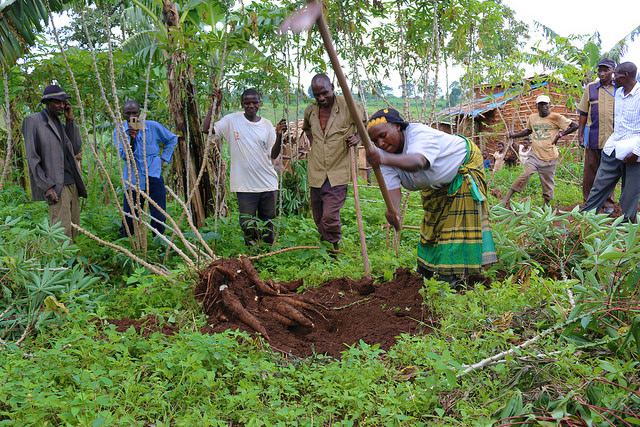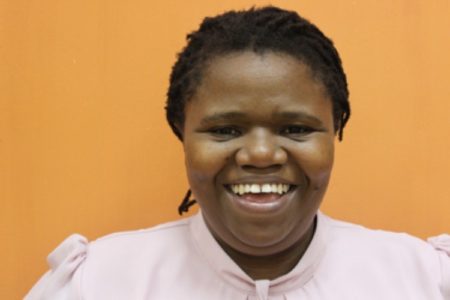Gender plays an important role in agriculture. Men and women often have different access to land and prioritize different aspects of agriculture production. In order to increase adoption rates and make a greater impact on food security research needs to account for these differences. We recently spoke with Dr. Netsayi Noris Mudege, CIP’s gender integration coordinator, on how gender influences decision making and the role it should play in research and development.
Q: What are the goals of inclusive agriculture?

This concept of inclusive agricultural development seeks to ensure that both men and women are benefiting. It’s not only about increasing productivity. If women benefit from agriculture, they are also more likely to want to produce more because they know they can benefit in terms of income.
In a study we did in Malawi, a woman mentioned that although she was not getting a lot of money from selling of sweet potato vines, she doesn’t (have to go) to her husband, to ask for money for little things like buying food, sugar, vegetables or meat. We are making small progress. One day we’ll be talking about 50-50 equity and women’s empowerment.
Q: Does gender integration involve only women?
Gender relations is not about women only. In Kenya, we discovered that although we were promoting access to nutritious foods, such as eating orange fleshed sweet potato we were only talking to women.
We noticed that we left the men out of the communication yet the men were the ones who were responsible for allocating land for agricultural production. We discovered that women could not actually plant the orange fleshed sweet potato, if they did not yet have access to land. So what we eventually did was include men in the communication and promotion of orange fleshed sweet potato.
Q: What are the main challenges of gender integration in agriculture?
One of the issues that is a bigger challenge for women is access to fertile land. Sometimes in different countries, men have the role of allocating land. Women normally get the land which is marginal (and) women who may be widowed, or are single, are usually not having access to fertile land.
The lack of involvement of women in agricultural research and technology development is also a major challenge because some of the technology that is developed may not meet women’s needs.
Then the third (challenge) is training. The people attending training are usually men. I can give you an example of a project that we’re doing in Malawi: the men said that they didn’t really think that the women could understand (the) things taught during (the) agricultural training and they would prefer that the men, attend such trainings. Usually, women are the ones actually providing the labor in terms of weeding, and sometimes the application (of inputs like fertilizer). If they do not have any knowledge on agronomic practices, then that can also bring agriculture down.
Q: What can be done to help close the gender integration gap?
I think many things can be done to close the gender gap in agricultural development. Currently this world wide movement from big donors, for example, like the African Development Bank, they are promoting inclusive agricultural growth. This would mean that both men, women, and youth, marginalized groups are able to benefit from agricultural employment. They are also able to increase their incomes and benefit from those incomes.
For example in our research what we have found is that sometimes we are so focused in increasing productivity that we don’t take time find out who is benefitting from that productivity. In some cases, for example in Malawi, where we talked to men who come from matrilineal communities some of them mentioned that when they sell agricultural produce the wives just take the money away from them and they don’t tell them how they used the money and when they try to find out, they are told this is my land if you are not happy you can leave. It can also happen to women in some patrilineal communities where they don’t see the benefits of agricultural growth. As we work to improve agricultural productivity we should also try to improve other approaches to make sure that those who are involved in agriculture, whether they are men, they are women, or they are youth, also benefit from agricultural productivity.
What we want to find out, is how do gender relations affect women’s ability to adapt new technologies, how do they affect the ability to innovate, and also do they have the ability to benefit from the technologies that we are currently developing.
We hope that once these findings are in, it will help us to further develop gender strategy and guidelines for scientists on what they need to do if they want to make sure that both men and women benefit (from their research).
Q: What kind of strategies is CIP employing to help make our work more inclusive?

When I joined CIP there was very little understanding on what gender integration is all about. We started a training trajectory for our scientists and we have trained probably close to 46 scientists now – who have knowledge on how to do gender integration even if they don’t do it themselves.
I used to have a colleague I’d talk to about gender mainstreaming and how to do it and why it was important. He kept saying, “I know how to do gender mainstreaming.” I convinced him to attend a gender training that we conducted. After he attended that training he went to his office and looked at his data set, and he came to my office later and said, “you know what? I thought I knew how to do gender research, but now I’ve looked in the data set, I do not have enough women for me to do sex disaggregated data analysis.”
So from that moment onwards, when he goes to the field to do more research, he’s always making sure that he has enough women and enough men in his sample even if he is doing random sampling that he can actually do sex disaggregated analysis to understand what’s the use of men are, what the use of women are, in terms of technologies that are being developed.
Q: How has being a woman impacted the way people see your work?
Some women farmers have come to me and said I want to be just like you. These are women in rural areas, who themselves are not educated. They don’t have a profession except of course farming but they recognize that their daughters need to achieve more. They can see that it is possible because they are seeing women scientists coming to their communities to work with them on different things, to give them advice, and also learn from the farmers. So I think that can actually be helpful beyond just the organization.
Dr. Netsayi Noris Mudege is a Zimbabwean born anthropologist. She joined CIP in 2013.
Links to publications:
N.N Mudege, E. Kapalasa, T. Chevo, T. Nyekanyeka, and P. Demo (2015) Gender norms and the marketing of seeds and ware potatoes in Malawi Journal of Gender Agriculture and Food Security 1 (2), pp 18-41, 2015 http://www.agrigender.net/views/marketing-of-seeds-and-ware-potatoes-in-Malawi-JGAFS-122015-2.php
Netsayi N. Mudege, Tafadzwa Chevo, Ted Nyekanyeka,Eliya Kapalasa& Paul Demo (2016) Gender Norms and Access to Extension Services and Training among Potato Farmers in Dedza and Ntcheu in Malawi. The Journal of Agricultural Education and Extension: Competence for Rural Innovation and Transformation 22 (3) , 291-305 http://www.tandfonline.com/doi/abs/10.1080/1389224X.2015.1038282
Netsayi N. Mudege, Ted Nyekanyeka, Eliya Kapalasa, Tafadzwa Chevo, Paul Demo, (2015) Understanding collective action and women’s empowerment in potato farmer groups in Ntcheu and Dedza in Malawi. Journal of Rural Studies 42:, pages 91-101. http://www.sciencedirect.com/science/article/pii/S0743016715300188
